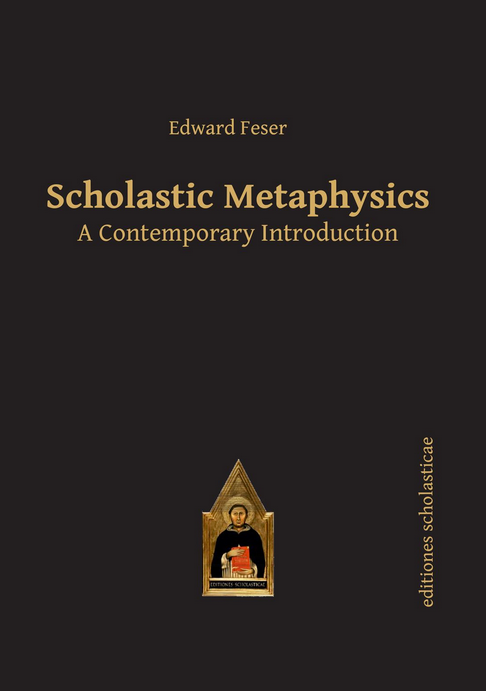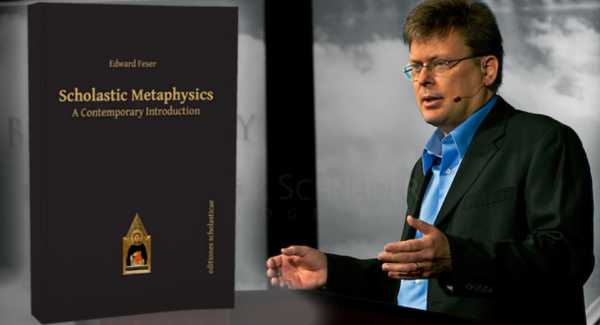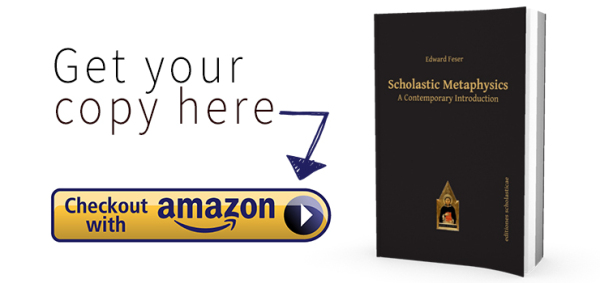Scholasticism vs. Scientism: An Interview with Dr. Edward Feser
by Brandon Vogt
Filed under Christianity and Science, Interviews, The Existence of God
Dr. Edward Feser is one of today's foremost Catholic philosophers who specializes in Aristotelian/Thomistic metaphysics and the philosophy of religion. He's an associate professor of philosophy at Pasadena City College and the author of several published articles and books, including The Last Superstition, Aquinas, and Philosophy of Mind (A Beginner's Guide). He's also written several articles here at Strange Notions.
Dr. Feser's newest book, which I'm discussing with him today, is titled Scholastic Metaphysics: A Contemporary Introduction (Editions Scholasticae, 2014). The book offers a general overview of Aristotelian/Thomistic ideas like causation, substance, essence, modality, identity, persistence, and teleology, and has already been hailed as an important contribution to the understanding of Scholastic thought.
BRANDON: The title of your book is Scholastic Metaphysics. How do you define "Scholastic", and how is "Scholastic" metaphysics distinct from others?
DR. EDWARD FESER: As the term was originally used, a “Scholastic” was the master of a school in the Middle Ages. The label came to be applied to professors in medieval universities, and, ultimately, to anyone who adhered to the way of thinking that dominated the medieval universities.
 That way of thinking is difficult adequately to adequately and concisely summarize, but essentially it involved the development and application of ideas and arguments derived from classical, and in particular Platonic and Aristotelian, philosophy. The aim was in part to provide a philosophical statement and defense of Christian theology, but medieval Scholastics were (and contemporary Scholastics are) naturally also interested in philosophical and scientific issues for their own sake. In some Scholastic thinkers, such as St. Anselm and St. Bonaventure, Platonism as filtered through writers like Plotinus and St. Augustine was the dominant tendency. In other and especially later thinkers, such as St. Thomas Aquinas, Duns Scotus, and William of Ockham, Aristotelianism took center stage. Methodologically, Scholastic writers also came to value precision in the use of language, rigorous argumentation, and systematic thinking.
That way of thinking is difficult adequately to adequately and concisely summarize, but essentially it involved the development and application of ideas and arguments derived from classical, and in particular Platonic and Aristotelian, philosophy. The aim was in part to provide a philosophical statement and defense of Christian theology, but medieval Scholastics were (and contemporary Scholastics are) naturally also interested in philosophical and scientific issues for their own sake. In some Scholastic thinkers, such as St. Anselm and St. Bonaventure, Platonism as filtered through writers like Plotinus and St. Augustine was the dominant tendency. In other and especially later thinkers, such as St. Thomas Aquinas, Duns Scotus, and William of Ockham, Aristotelianism took center stage. Methodologically, Scholastic writers also came to value precision in the use of language, rigorous argumentation, and systematic thinking.
This emphasis on linguistic precision and argumentative rigor differentiates Scholastic thinking from more literary and unsystematic approaches to philosophy and theology. It also makes Scholastic thought comparable in some respects to contemporary analytic philosophy. On the other hand, the emphasis on classical, and especially Aristotelian, metaphysical ideas differentiates Scholastic thinking from most contemporary philosophy. There is, to be sure, a revival of interest in Aristotelian metaphysical ideas -- concerning the nature of causality, essentialism, substance, and so forth -- even in contemporary mainstream analytic philosophy, and that is in fact one of the themes of my book. But it is still at this moment a minority tendency.
BRANDON: Who did you write this book for? Is it a book for absolute beginners or those with some philosophical background? Would atheists benefit from it?
DR. EDWARD FESER: It is not a book for absolute beginners. The aim of the book is to introduce key Scholastic ideas and arguments in metaphysics to those who have some familiarity with contemporary philosophy, and also to introduce the neo-Aristotelian tendencies in contemporary mainstream analytic philosophy to those who have some familiarity with Scholastic thought. As I show in the book, Scholastic ideas and arguments are not only defensible within the context of modern analytic philosophy, they are to a large extent in fact already being defended by contemporary philosophers who have no theological ax to grind. The ideas are being rediscovered because they are essential to making sense of what we know from modern science and to the solution of philosophical problems that secular thinkers, no less than religious ones, are interested in.
Atheists with a taste for philosophy -- and any serious atheist had better have a taste for it, because the dispute between theism and atheism is at bottom a philosophical dispute and not a scientific one -- would definitely benefit from my book. You cannot properly understand the arguments of thinkers like Aquinas -- whether they are arguments for God’s existence, or for the immortality of the soul, or natural law arguments in ethics, or whatever -- unless you understand the background metaphysical ideas about the nature of causation, the nature of material objects, what it is for a thing to have an essence or nature, and so forth, that the arguments presuppose. Most atheist critics of Aquinas and other major theistic philosophers have no familiarity with these background metaphysical ideas, and so they usually badly misunderstand the arguments they are criticizing.
To be sure, my book does not have a lot to say about arguments for God’s existence, or about the soul or ethics. I have addressed those issues elsewhere, such as in my books The Last Superstition and Aquinas. What the new book does is set out the metaphysical background ideas at far greater length and in much greater depth than I have elsewhere.
BRANDON: In the book's opening chapter, titled "Prolegomenon," you write, "The Aristotelian theory of actuality and potency provides the [book's] organizing theme." What is this theory, and how do we know it's true?
DR. EDWARD FESER: Well, chapter 1 and indeed the book as a whole provides the answer to that question! But, very briefly: Pre-Socratic thinkers like Parmenides and Zeno put forward some very odd but also clever arguments purporting to show that change and multiplicity are illusions. The arguments assume, among other things, that change would require a transition from non-being to being, from sheer nothingness to something. Aristotle pointed out that that’s not the case. For there are two kinds of being: being in actuality (as when an acorn is actually small) and being in potentiality (as when an acorn, though actually small, is at the same time potentially a very tall tree). And change involves, not a transition from nothingness to something or non-being to being, but rather from one kind of being to another, namely from potentiality to actuality.
Scholastic writers argue that there is no way to account for change other than by recognizing that potentiality is as real a feature of the world as actuality, and they also argue that the existence of change cannot coherently be denied. Hence we know that actuality and potentiality are both real features of the world. Now, the implications of this are many and wide-ranging, as I show in the book. The theory of actuality and potentiality determines the correct way to think about causation, teleology, the nature of material substance, what it is for a contingent thing to exist, etc. It also forms the starting point for one of Aquinas’s key arguments for God’s existence, namely the First Way.
The vast majority of contemporary atheists know nothing at all about the theory of actuality and potentiality. That is one reason they generally deeply misunderstand the arguments Aquinas and other Scholastic writers present for the existence of God, and many other arguments as well.
BRANDON: You spend several pages engaging scientism. How do you define this notoriously controversial term? Why is scientism popular today, and why do you think it's self-defeating?
DR. EDWARD FESER: This too is addressed in the book at length. Briefly, scientism is the view that science alone gives us knowledge of reality. Of course, that just raises the question of what we mean by “science.” One problem with scientism is that if you define “science” narrowly -- so that it includes physics and chemistry, say, but not philosophy or theology -- then scientism ends up being self-refuting, because it is not itself a scientific claim but a philosophical one. On the other hand, if you define “science” broadly enough so that it avoids being self-refuting, then it becomes vacuous, because it now no longer rules out philosophy, theology, or pretty much anything else adherents of scientism want to be able to dismiss without a hearing as “unscientific.”
A second problem with scientism is that science cannot in principle give us a complete description of the world, both because science takes for granted certain assumptions it cannot justify in a non-circular fashion (such as that perception is reliable, that there is order in the world that is really there and not just projected onto it by the mind, etc.), and because the methods of science of their nature can obscure as much as they reveal. For example, as the philosopher Bertrand Russell -- who was no friend of Scholasticism or of religion -- often emphasized, the methods of physics give us only the abstract mathematical structure of physical reality, but do not and cannot tell us the intrinsic nature of whatever is the underlying reality that has that structure.
A third problem is science cannot in principle provide a complete explanation of the phenomena it describes. Science explains things by tracing them down to ever deeper laws of nature. But what it cannot tell you is what a “law of nature” is in the first place and why it operates. It really is amazing how unreflectively atheists and advocates of scientism appeal to the notion of “laws,” given how deeply philosophically problematic the very notion is. Earlier generations of scientists were aware of the philosophical puzzles raised by the nature of scientific explanation, and some contemporary scientists (such as Paul Davies) are also sensitive to the puzzles raised by the very idea of a “law of nature” (which is actually a holdover from an idiosyncratic theology to which Descartes and Newton were committed, but which Aristotelian and Scholastic philosophers reject just as much as atheists do).
But most contemporary scientists tend not to have the general education that figures of the generation of Einstein, Schrödinger, and Heisenberg did. They don’t know philosophy well, and they also don’t know what they don’t know. This goes double for the more aggressively atheistic ones among them -- people like Lawrence Krauss, Peter Atkins, Richard Dawkins, and Jerry Coyne. Hence they repeatedly commit very crude philosophical mistakes but also refuse to listen or respond when these mistakes are pointed out to them.
Anyway, the main reason scientism has the following it does is probably that people are, quite rightly, impressed with the technological and predictive successes of modern science. The trouble is that this simply gives us no reason whatsoever to believe scientism -- that is to say, it gives us no reason to believe that science alone gives us knowledge. To draw that conclusion you need to assume that if something is real, then it will be susceptible of a precise mathematical description that will make strict prediction and technological application possible. Now that is itself a philosophical or metaphysical assumption, not a scientific one. But it is also an assumption that there is not only no reason to believe, but decisive reason to reject, as I argue in the book.
What the mathematically-oriented methods of modern physics do is to focus on those aspects of nature which can be strictly predicted and controlled and to ignore anything that doesn’t fit that method. As a result, physics tends brilliantly to uncover those aspects of reality that fit that method, and which can therefore be exploited technologically. But it simply does not follow that there are no other aspects of reality. To think otherwise is like the drunk’s fallacy of assuming that his lost car keys must be under the street lamp somewhere, because that is where the light is.
BRANDON: Many atheists maintain that contemporary science -- specifically quantum mechanics and special relativity -- has refuted Scholastic metaphysical concepts like cause and effect. Is this the case?
DR. EDWARD FESER: It is not the case, and the arguments for this claim tend to commit the same fallacy I just referred to, of assuming that if something is left out of the description of things that physics gives us, then it is not real. That is like a pencil artist saying that since he cannot capture color in the black and white artistic materials he has available to him, it follows that color is not real. Again, physics captures what is susceptible of capture via its mathematical mode of description. If something is real but not susceptible of capture via such methods, physics will not capture it. That merely reflects the method, though, not the reality the method is only partially describing. The trouble is that, as the historian of science E. A. Burtt once pointed out, advocates of scientism have fallaciously confused method with metaphysics. Instead of judging their method by reference to reality, they judge reality by reference to their method.
There are other problems too with the claim that physics has somehow undermined the notion of causality, and I discuss them in the book. For one thing, people who make this claim often confuse what is really just one kind of causality -- deterministic causality -- with causality as such. They also fail to realize that the only way we can make sense of the idea that observation and experiment give us a rational justification for believing physical theory is if we suppose that our perceptual faculties are causally related to external reality (which is something else that Bertrand Russell emphasized). And so forth.
BRANDON: You argue that, for the Scholastic, "metaphysics is prior to epistemology." What does this mean and why is it important?
Metaphysics is the rational investigation of the general structure of reality and the ultimate causes of things. Epistemology is the study of the nature of knowledge and of its scope and foundations. Modern philosophers have often criticized specific metaphysical ideas and even the very possibility of metaphysics on the basis of epistemological assumptions. They have claimed that the way knowledge actually works rules out our having the kind of metaphysical knowledge that Scholastics and other traditional metaphysicians say we have. Advocates of scientism essentially take this view.
The trouble is that this gets things precisely backwards. All epistemological claims make metaphysical assumptions -- assumptions about what a mind is, how it is connected (or not connected) to external reality, and so forth. Criticisms of metaphysical claims put forward in the name of epistemology themselves thus implicitly presuppose various metaphysical claims. Metaphysics is absolutely fundamental -- the most fundamental discipline of all, more fundamental than epistemology, physics, biology, or any other philosophical or scientific discipline. Attempts to show otherwise always implicitly confirm this, insofar as they always surreptitiously presuppose some metaphysical position, rather than eliminating metaphysics or relegating it to a secondary status.
BRANDON: How is the Scholastic metaphysical framework helpful for defining God or demonstrating his existence? Is it true that the old Scholastic arguments for God have been mostly refuted?
It is not only helpful but absolutely crucial, because the key traditional arguments for God’s existence all rest on certain specific metaphysical analyses of cause and effect, change, the nature of material substances, and so forth. And these analyses begin with what any possible natural science must take for granted, so that they deal with a level of reality that is deeper than science and untouched by it. And no, the old Scholastic arguments for God’s existence have not been refuted. As I have said, most people who criticize them don’t even understand them, because they know nothing about the metaphysical ideas that underlie them. Among the things my book does is to show how these metaphysical ideas are not only still defensible today, but in fact are being defended (sometimes unknowingly) by contemporary academic philosophers who have no interest or stake in the theological applications Scholastic writers made of the ideas.
Related Posts
Note: Our goal is to cultivate serious and respectful dialogue. While it's OK to disagree—even encouraged!—any snarky, offensive, or off-topic comments will be deleted. Before commenting please read the Commenting Rules and Tips. If you're having trouble commenting, read the Commenting Instructions.














